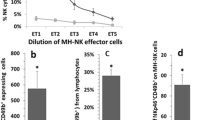Abstract
Prostaglandin E2 (PGE2) is generally accepted to be an immunosuppressant produced by cancer cells and their surrounding macrophages. Although several investigators have reported detecting high concentrations of PGE2 in the portal veins of patients with colorectal cancer, the relationship between these high concentrations of PGE2 in the portal vein and liver-associated immunity remains unclear. In this study, we attempted to determine if the portal administration of PGE2 suppresses the immune function of the liver in a rat model. Donryu rats were administered PGE2 via the portal vein for 7 days, following which the cytotoxic activity of hepatic sinusoidal lymphocytes (HSL) against natural killer (NK)-sensitive YAC-1 and rat syngeneic AH60C tumor cells was assessed. Purified HSL are spontaneously cytolytic; however, the continuous administration of PGE2 dramatically suppressed the cytotoxic activity of HSLs in a dose-dependent fashion. Flow cytometric analysis showed that the large granular lymphocyte (LGL) fraction, hepatic natural killer (pit) cells, and CD4−8+ killer/suppressor T cells were mainly reduced in number in the HSLs following PGE2 infusion. In this rat AH60C metastasis model, the continuous administration of PGE2 increased the number and size of metastatic tumor nodules in the liver, suggesting that high concentrations of PGE2 in the portal vein suppress liver-associated immunity and promote the formation of hepatic metastasis.
Similar content being viewed by others
References
Honn KV, Bockman RS, Marnett LJ (1981) Prostaglandins and cancer: a review of tumor initiation through tumor metastasis. Prostaglandins 21(5):833–864
Lynch NR, Salmon JC (1979) Tumor growth inhibition and potentiation of immunotherapy by indomethacin in mice. J Natl Cancer Inst 62:117–121
Bennett A, McDonald AM, Stamford IF, Charlier EM, Simpson JS, Zubro T (1977) Prostaglandins and breast cancer Lancet 1:624–626
Balch CM, Dougherty PA, Cloud GA, Tilden AB (1984) Prostaglandin E2-mediated suppression of cellular immunity in colon cancer patients. Surgery 95:71–77
Sunouchi K (1990) The role of prostaglandin E2 on liver metastasis of colorectal carcinoma (in Japanese with English abstract). Nihon Shoukaki Geka Gakkai Zasshi (Jpn J Gastroenterol Surg) 23:1220–1231
Bouwens L, Jacobs R, Remels L, Wisse E (1989) Natural cytotoxicity of rat hepatic natural killer cells and macrophages against a syngeneic colon adenocarcinoma. Cancer Immunol Immunother 27(2):137–141
Okuno K, Takagi H, Nakamura T, Nakamura Y, Iwasa Z, Yasutomi M (1986) Treatment for unresectable hepatoma via hepatic arterial infusion of lymphokine-activated killer cells generated from autologous spleen cells. Cancer 58:1001–1006
Malter M, Friedrich E, Süss R (1986) Liver as a tumor cell-killing organ: Kupffer cells and natural killers. Cancer Res 46:3055–3060
Goodwin JS, Ceuppens (1983) Regulation of the immune response by prostaglandins. J Clin Immunol 3:295–308
Goto T, Herberman RB, Maluish A, Strong DM (1983) Cyclic AMP as a mediator of prostaglandin E-induced suppression of human natural killer activity. J Immunol 130:1350–1355
Betz M, Fox BS (1991) Prostaglandin E2 inhibits production of Th1 lymphocytes but not of Th2 lymphocytes. J Immunol 146:108–113
Johnkoski JA, Tzung SP, Doerr RJ, Cohen SA (1992) Augmentation of the immune response of the murine liver by levamisole. Am J Surg 163:202–207
Kaneda K, Dan C, Wake K (1983) Pit cells as natural killer cells. Biomed Res 4:567–576
Gorelik E, Wiltrout RH, Okumura K, Habu S, Herberman RB (1982) Role of NK cells in the control of metastatic spread and growth of tumor cells in mice. Int J Cancer 30:107–112
Talmadge J, Meyers K, Prieur D, Starkey J (1980) Role of NK cells in tumor growth and metastasis in beige mice. Nature 284:622–624
Hanna N, Fidler I (1981) Relationship between metastatic potential and resistance to natural killer cell-mediated cytotoxicity in three murine tumor systems. J Natl Cancer Inst 66:1183–1190
Riccardi C, Pucceti P, Santoni A, Herberman RB (1979) Rapid in vivo assay of mouse NK cell activity. J Natl Cancer Inst 63:1041–1045
Barlozzari T, Leonhardt J, Wiltrout RH, Herberman RB, Reynolds CW (1985) Direct evidence for the role of NK cells in the inhibition of experimental tumor metastases. J Immunol 134:2783–2389
Wiltrout RH, Herberman RB, Zhang R, Chirigos MA, Ortaldo JR, Green KM, Talmadge JE (1985) Role of organ-associated NK cells in decreased formation of experimental metastases in lung and liver. J Immunol 134:4267–4275
Johnkoski JA, Tzung SP, Doerr RJ, Cohen SA (1992) Hepatic metastasis alters the immune function of murine liver nonparenchymal cells. Arch Surg 127:1325–1329
Seki S, Abo T, Sugiura K (1991) Reciprocal T-cell responses in the liver and thymus of mice injected with syngeneic tumor cells. Cell Immurol 137:46–60
Author information
Authors and Affiliations
Rights and permissions
About this article
Cite this article
Okuno, K., Jinnai, H., Lee, Y.S. et al. A high level of prostaglandin E2 (PGE2) in the portal vein suppresses liver-associated immunity and promotes liver metastases. Surg Today 25, 954–958 (1995). https://doi.org/10.1007/BF00312380
Received:
Accepted:
Issue Date:
DOI: https://doi.org/10.1007/BF00312380




